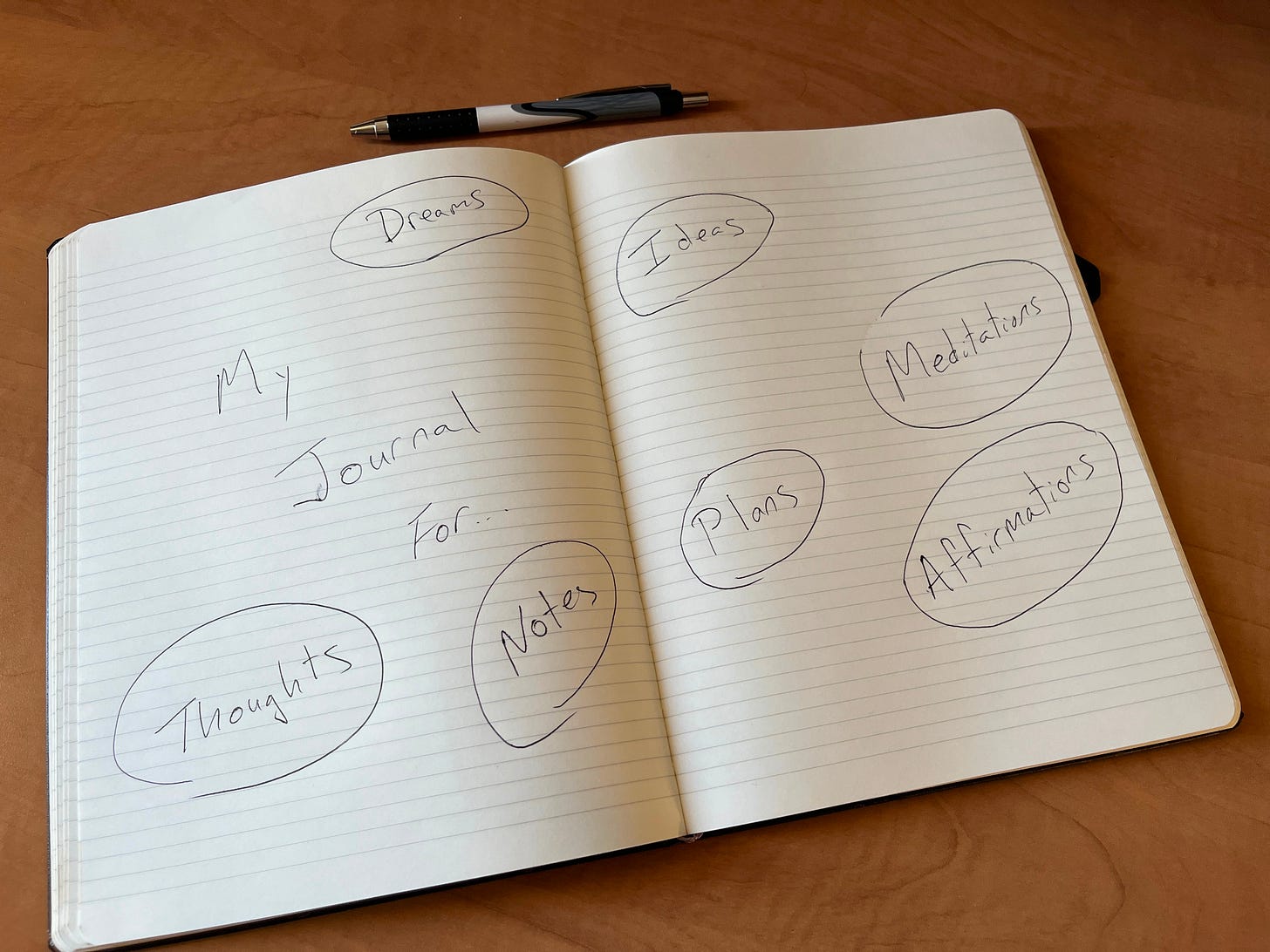Writing Away Worries: How Active Journaling Helps With Letting Go
Some of the hardest letting go you may have to do is when a beloved person or pet passes away. Keeping a journal actively using it can help with this process.
If you follow my writing, you’ll have noticed that I often refer to journaling. If you read the preparation section in the first part of my book, you’ll see that getting a journal is one of the first steps I tell my readers to take.
I travel with my journal and I write in it every day. My journal serves many purposes (including writing rough drafts for articles like this one!). Still, I also find journaling to be a fantastic aid and support for my mental health and emotional well-being. A journal is a powerful tool because it is easy to use (all I need is a pen) and access (it doesn’t have a battery that can run out) and has no operating system or commands I need to learn. I can write, sketch, or scribble into it however I want.
I have found writing in my journal to be particularly powerful during times when I need to let go of negative thoughts, hard feelings, or traumatic experiences. My journal helps me let go of big and small traumas (along with all the sizes in between). So, when I have an experience I want to let go of, actively writing about it in my journal helps me process it. When I write about my experiences, I calm my thoughts and enjoy more peace of mind.
Journaling is beneficial for many reasons. However, here are a few specific benefits that have helped me let go of negative thoughts and feelings.
Externalize Whatever is Getting You Down
First, by journaling, I am moving the experience I want to let go from inside my mind into my journal. By writing it down, the idea now exists outside of me on one of my journal pages. As words on a page, I can deal with thoughts and feelings more objectively. For example, thinking about my beloved dog passing away makes me feel sad, and the combination of thoughts, images, memories, and feelings that flood my mind when I consider this makes it hard for me to deal with. However, when I see the idea of my dog’s passing written on paper, it is far easier to see it for what it is: a fact about a past event. I have agency and get to decide what to do with this information. Writing it down makes it far easier for me to understand, deal with, and move forward.
Getting Precise About It
Another benefit of journaling about things I would like to let go of is that a journal enables me precision. When I write, “My dog Buddy’s passing makes me feel sad,” I know this is not quite right. I can tell that it’s not precise. However, when I write, “My dog Buddy’s passing makes me feel sad because I feel guilty that I could have done more to give Buddy a better life.” That’s a lot more precise and now I’m getting at the root of the matter of why I have had trouble getting over the death of my dog. Guilt is a powerful emotion, so no wonder I feel sad when I think of my dog passing away. The precision that comes from journaling about the experience helps me better understand the source of my feelings.
Clarity On the Resolution
As it’s helped me achieve objectivity and precision, journaling also helps me resolve my feelings. Now, underneath the line about my feelings of guilt, I can write, “Buddy lived for 19 years and was a happy dog. She had a good life and died of old age with people she loved around her. Buddy had the best life possible and I treasure many happy memories of our time together.” No matter how I may feel at a given moment, it’s pretty hard to look at my journal and argue with this! My journal reminds me and reinforces my positive experiences and happy memories of my dog.

It Still Takes Time
From the examples above, I hope that I have illustrated how active journaling can be a positive part of a healing process for letting go. However, letting go takes time. Although journaling in the way I have about my dog has helped me feel better and given me much peace of mind, there are still times when I think of Buddy and feel sad. My journaling also reminds me of the many positive experiences and happy memories I have of her! I would say that today, I am much happier and enjoy more peace of mind when I think of Buddy than I did in the weeks shortly after she passed away. I am grateful that I discovered journaling and its benefits because it’s helped me feel so much more at ease when I remember my time with my beloved dog.
Find Your Reason for Journaling
I rely on my journal for many reasons, including helping me to let go. You may find journaling useful for a variety of reasons as well. However, if you haven’t started already, I highly recommend getting a journal (it doesn’t have to be expensive) and beginning a practice of journaling each day. I probably write for no more than ten minutes daily in my journal and find it highly beneficial. In the comments below, feel free to share if you keep a journal. What kinds of things do you like to journal about?
Enjoying Chasing Dreams?
Subscribe for free weekly articles.
Become a Paid Subscriber for exclusive articles, receive feedback on your writing, plus a free e-copy of my book “Meeting People in Real Life.”
Become a Founding Member and enjoy all the Paid Subscriber benefits and private coaching.





I have journalled in the past, and continue to do so. But lately, I'm finding that posting on Substack and getting ZERO comments or likes is beginning to get me down. Actually, it's more than getting me down, it makes me downright miserable. I don't mind the work of writing, but for it to be flung against a wall? Sometimes it is more than I can take. Not sure if I have what it takes to continue. If I burn out on this writing journey, it won't be the first time. I doubt a journal is going to fix it. But maybe it will?
I am very bad at journaling. I normally journal only when I am going through hard times and need to get my thoughts and emotions out on paper. Otherwise, it just falls by the wayside.
Maybe because I like to buy beautiful journals and then don't use it because my writing can be very untidy - spoiling that beautiful book!